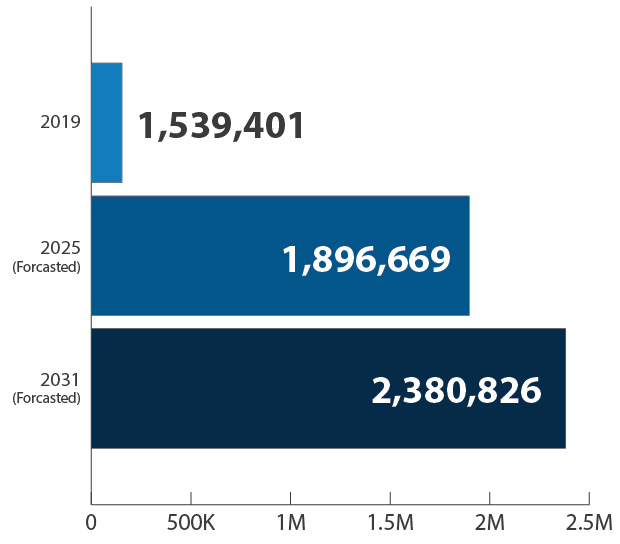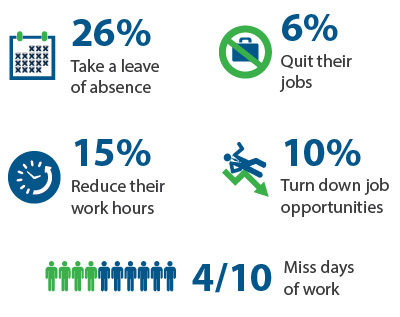This website uses cookies so that we can provide you with the best user experience possible. Cookie information is stored in your browser and performs functions such as recognising you when you return to our website and helping our team to understand which sections of the website you find most interesting and useful.
Support Better Aging and Older Adult Care

The COVID-19 pandemic revealed longstanding shortcomings in the way Canada supports and provides care for older adults.
After decades of chronic underfunding and understaffing, long-term care organizations across the country were too often unpreparedClose to 70% of Canada’s COVID-19 fatalities have occurred in long-term care.1 for a crisis of this magnitude, which left residents and staff vulnerable to COVID-19 and its impacts.
The pandemic also underscored the critical role caregivers play in providing care to older adults. Spouses, children, friends, and neighbours often act as essential partners in care where services are inadequate, inaccessible, or out of reach – geographically and financially.
Canadian seniors are increasingly fearful that they will not have the supports they need to live a dignified life independently, or in a care setting. All levels of government owe it to our older adult population to shore up resources to meet the challenges of Canada’s growing and aging population.
Click links below to jump to a section
What actions can Canada take to support better aging and older adult care?
Why must Canada support better aging and older adult care?
HealthCareCAN actions to support better aging and older adult care
What actions can Canada take to support better aging and older adult care?
- Create communities that allow adults to age in place and address the social determinants of health, such as housing, transportation, and nutrition, that affect healthy aging.
- Develop a national approach to support better aging and improve health and social services for older Canadians, backed by substantial investments to meet the current and future needs of Canada’s aging population.
- A dedicated federal transfer to improve long-term care and home care supports for aging in place.
- Implement federal legislation and standards specific to the long-term care sector.
- Shift to providing more home and community care.
- Increase staffing and improve working conditions in long-term care and home care organizations.
- Increase funding in research and innovation related to aging to deliver concrete improvements in older adult care.
- Provide better financial and social supports for unpaid caregivers.
Why must Canada support better aging and older adult care?
Life expectancy in Canada is risingBy 2030, an anticipated 1 in 5 Canadians will be 65 years and older, according to a CanAge publication from August 2020 titled VOICES of Canada’s seniors: a roadmap to an age-inclusive Canada., and people across Canada can expect to live longer, better lives, but with that longevity comes increased chance of developing chronic health issues, many of which require more complex health and social services. Many older adults want to age at home, in their communities, but Canada’s infrastructure is not set up to meet their needs and accommodate them as they age.
Furthermore, unpaid caregivers, who often act as essential partners in care where services are inadequate, inaccessible, or out of reach, are saving the health system an estimated $9 billion a year and personally incurring an estimated $33 billion in direct and indirect costs2 – such as out-of-pocket expenses, lost productivityThe estimated cost to the Canadian economy from lost productivity is 1.3 billion per year. 3, and forgone vacation time – annually.
There must be fundamental transformation to reimagine older adult care in this country and better support Canada’s caregivers.
Creating communities that allow adults to age in place will:
- Allow older adults to live a more independent, active, and dignified life.
- Address the social determinants of health that affect healthy aging.
- Combat loneliness among older adults.
- Fill gaps that exist between home and long-term care.
- Decrease demand on acute care resources.
% of Canadians aged 65+ who say they will do everything possible to avoid a stay in LTC

Source: Ipsos. 2020. Safer at home: Eight in ten Canadians vow to do all they can to avoid going into long-term care.
Developing a national approach to better aging and older adult care will:
- Improve health and social services for older Canadians.
- Help Canada keep up with the demand for long-term care, home care, and the social services needed to support aging in place.
- Help build a system that reflects current data and research on the best practices for providing care and that incorporates the needs of residents and caregivers.
- Improve access and delivery of high-quality long-term care regardless of where in the country a person lives.
- Increase staffing and improve working conditions for the long-term and home care workforce.
- Enable further research and innovation to enhance the lives of Canada’s older adults.
Number of patients with demand for long-term care and home care (click image to expand)
Source: Deloitte. 2021. Canada’s elder care crisis: Addressing the doubling demand.
Providing better financial and social supports for unpaid caregivers will:
- Help recognize unpaid caregivers’ role as essential partners in care.
- Offset the direct and indirect costs incurred by unpaid caregivers while carrying out caregiving duties.
- Help address the physical and emotional toll of caregiving duties.
The financial and career impacts to unpaid caregivers (click image to expand)
Source: Canadian Caregiver Coalition. 2015. Care & work: A balancing act.
HealthCareCAN actions to support better aging and older adult care
Recent and related letters, statements, media appearances, and press releases
Fixing health system flaws requires better data sharing and workforce strategies, say health-care experts
February 14, 2024
Advocating for your health in a flooded healthcare system - Interview with Dr. Michael Gardam, Chair of HealthCareCAN's Board of Directors.
January 29, 2024
Improving access to palliative care starts with better data collection - HealthCareCAN op-ed in the Hill Times
May 11, 2023
HealthCareCAN continues to connect with federal health, research and innovation decision-makers
April 4, 2023
Improving the health system for patients, providers, and researchers focus of HealthCareCAN meeting with Shadow Minister of Health Stephen Ellis
February 21, 2023
Band-Aids or a New Healthcare System: In Conversation with Dr. Michael Gardam on the Necessary Conditions for Transforming Healthcare in Canada. Listen now!
February 16, 2023
Will More Money Fix Canada's Health Care System? HealthCareCAN Board Chair, Dr. Michael Gardam on TVO's The Agenda with Steve Paiken
February 10, 2023
Dr. Michael Gardam, Chair of HealthCareCAN's Board of Directors discusses the federal health funding announcement on CPAC. Watch @15:45
February 8, 2023
Here’s what Canadians want as high-stakes health summit begins: ‘A significant shift’ - Interview with Dr. Michael Gardam, Chair, HealthCareCAN Board of Directors
February 7, 2023
Canada promised to fix health care almost 20 years ago. It’s looking to get things right once more - Interview with Dr. Michael Gardam, HealthCareCAN Board Chair
February 4, 2023
Dr. Michael Gardam, HealthCareCAN's Board Chair & CEO of Health PEI on CTV's Power Play to discuss solutions for Canada's healthcare crisis (play at 28:54)
December 14, 2022
Recent and related government submissions and policy documents
Canada’s healthcare: Promoting transformation of the system
Health human resources / Infrastructure / Long-term care / Mental health / Patient safety / Research & innovation / Year 2023
The urgent need to re-imagine older adult care in Canada
Indigenous health / Infrastructure / Long-term care / Patient safety / Year 2023
Measuring Jurisdictional Performance in Homecare and Mental Health Services
Long-term care / Mental health / Year 2023
HealthCareCAN submission to Finance Canada’s 2023 Pre-Budget Consultations
Health human resources / Infrastructure / Long-term care / Mental health / Pre-budget submissions / Research & innovation / Year 2023
Submission to the Standing Committee on Finance: Pre-Budget Consultations in Advance of the 2023 Federal Budget
Health human resources / Infrastructure / Long-term care / Mental health / Pre-budget submissions / Research & innovation / Year 2023
Submission to the Standing Committee on Health: Study on the Emergency Situation Facing Canadians in Light of the COVID-19 Pandemic
Health human resources / Indigenous health / Infrastructure / Long-term care / Mental health / Research & innovation / Year 2022
You may also be interested in:
- HealthCareCAN’s Press releases & statements
- HealthCareCAN’s Policy documents & government submissions
- HealthCareCAN’s Vice Presidents of Research Committee
- HealthCareCAN’s Health Human Resources Advisory Committee
- HealthCareCAN’s News
- HealthCareCAN’s “From the CEO’s Desk” Blog
Our voice is stronger, together.
To become a HealthCareCAN member or learn more about our member benefits, contact us at membership@healthcarecan.dev2.inter-vision.ca




